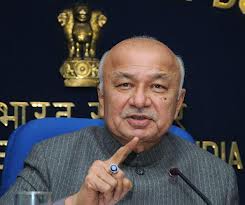 New Delhi, Jan 22: Fearful that the splitting of Andhra Pradesh could create a cascading effect on other states, the UPA-II government is considering the creation of a Telangana Territorial Administration on the lines of Gorkhaland.
New Delhi, Jan 22: Fearful that the splitting of Andhra Pradesh could create a cascading effect on other states, the UPA-II government is considering the creation of a Telangana Territorial Administration on the lines of Gorkhaland.
Informed sources pointed out that if that was the case, the Centre had to further amend Article 371 (D), which has already provided a special status for 10 backward districts of the Telangana region, and this could be done with the approval of two-thirds of Parliament strength.
The Centre may announce its decision on Telangana earlier than the January 28 deadline set by Union Home Minister Sushilkumar Shinde as he is scheduled to leave on a tour of Bangladesh on January 27. Without saying yes or no for Telangana, a middle path, such as the Gorkhaland model, might help the Centre as well as the Andhra Pradesh government buy peace in both the Telangana and Seemandhra regions of the State, and the Union government could qualify the decision stating that it would be on an experimental basis, the sources added.
Like Gorkhaland, the Telangana Territorial Administration, which could be formed without bifurcating Andhra Pradesh, might be an autonomous body with more financial and administrative powers and will be administered by an elected chief executive and members of the council.
By considering the Gorkhaland model for Andhra Pradesh, the Centre may unwittingly be able to douse the Gorkhaland demand. The Gorkhaland Territorial Administration in West Bengal has already warned the Centre of renewing its stir for a separate State. And the Centre believes that a separate state for Telangana may only add strength to the Gorkhaland agitation.
It may be recalled that the committee set up by the Centre to examine the demand for Telangana, headed by the former Supreme Court judge, Justice B.N. Srikrishna, had in its recommendations suggested that its sixth option “stands out as the best way forward” keeping the national perspective in mind.
The sixth option talks about keeping the State (Andhra Pradesh) united by simultaneously providing certain definite constitutional/statutory measures for the socio-economic development and political empowerment of the Telangana region — creation of a statutorily-empowered Telangana Regional Council.
“The united Andhra option is being suggested for continuing the development momentum of the three regions and keeping in mind the national perspective. With firm political and administrative management it should be possible to convey conviction to the people that this option would be in the best interest of all and would provide satisfaction to the maximum number of the people in the State.”
“It would also take care of the uncertainty over the future of Hyderabad as a bustling, educational, industrial and IT hub/destination. For management of water and irrigation resources on an equitable basis, a technical body, i.e., Water Management Board and an Irrigation Project Development Corporation in expanded role have been recommended. The above course of action should meet all the issues raised by Telangana people satisfactorily,” the Committee said in its report.
Of the 294 Assembly segments in Andhra Pradesh, 119 are located in the 10 districts of the Telangana region. Of the 42 Lok Sabha seats in the State, 17 are in the T-region.
Meanwhile, talking to The Hindu, Overseas Affairs Minister Vayalar Ravi, additional in charge of the Congress in Andhra Pradesh, said nothing on the separate State issue had been decided so far. “I told this clearly to a delegation of Congress Ministers, MPs and MLAs from the Seemandhra region when they met me demanding continuation of a united Andhra Pradesh. Similarly I am willing to meet the group from the Telangana regions too on Tuesday,” he said.
Seemandhra leaders led by Minister Shailajanath also called on senior Congress leader Digvijay Singh and Home Minister Sushil Kumar Shinde asking them not to divide A.P. at any cost.




Comments
Add new comment